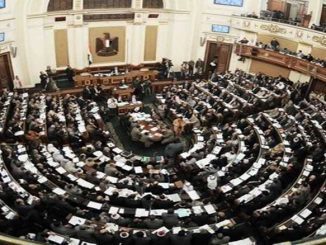
Egypt’s local currency strengthened from a record low against the US dollar on the black market after the central bank eased rules on the use of credit cards abroad, reported Bloomberg.
The Egyptian pound was changing hands at between 43-44 per dollar on the parallel market on Thursday, versus 48 the previous day, a number of traders said, according to Bloomberg.
That rate is still significantly weaker than the official one of 30.9, underscoring Egypt’s dire shortage of foreign currency.
There’d been a rush to hoard foreign exchange after the central bank last week started requiring customers to provide proof of travel before departure to use credit cards in other countries, said the people.
The regulator revised that directive on Thursday so users only need to notify their bank’s customer-service department and show evidence within 90 days of returning from the trip – an announcement that eased worries that yet-stiffer restrictions were to come.
A number of traders said they were pausing operations Thursday and waiting until the end of the day to assess the situation, as they struggled to find dollar buyers. The pound traded at about 42 on the parallel market a week ago.
Egypt has devalued the pound three times since early last year, leading it to lose almost half its value. Authorities says it’s shifting to a more flexible exchange rate, but delays in fully implementing that have held up the review of a crucial $3 billion International Monetary Fund rescue program.
Derivatives traders are hedging against the prospect of a further currency devaluation.
The pound’s 12-month contract in the non-deliverable forwards market has weakened almost 9% since mid-September, reaching 45.4 against the dollar on Thursday.
War impact on regional economies
In another context, economic crises are reportedly rippling through the countries bordering Israel, raising the possibility of a chain reaction from the war on Gaza that further worsens the financial health and political stability of countries like Egypt, Jordan and Lebanon and creates problems well beyond.
Each of the three countries is up against differing economic pressures that led the International Monetary Fund to warn in a September report that they could lose their “sociopolitical stability”, stated the Associated Press.
That warning came shortly before the Hamas attack of October 7, triggering a war that could easily cause economic chaos that President Joe Biden and the European Union would likely need to address, the AP stressed.
The possible fallout is now starting to be recognized by world leaders and policy analysts.
For a Biden administration committed to stopping the Israel-Hamas war from widening, the conflict could amplify the economic strains and possibly cause governments to collapse.
If the chaos went unchecked, it could spread across a region that is vital for global oil supplies — with reverberations around the globe.
“The more unstable things are economically, the easier it is for bad actors in the region to stir the pot,” said Christopher Swift, an international lawyer and former Treasury Department official.
“The notion that you can divorce politics from economics is a little bit myopic and naive. Politics, economics, and security go together very closely.”



